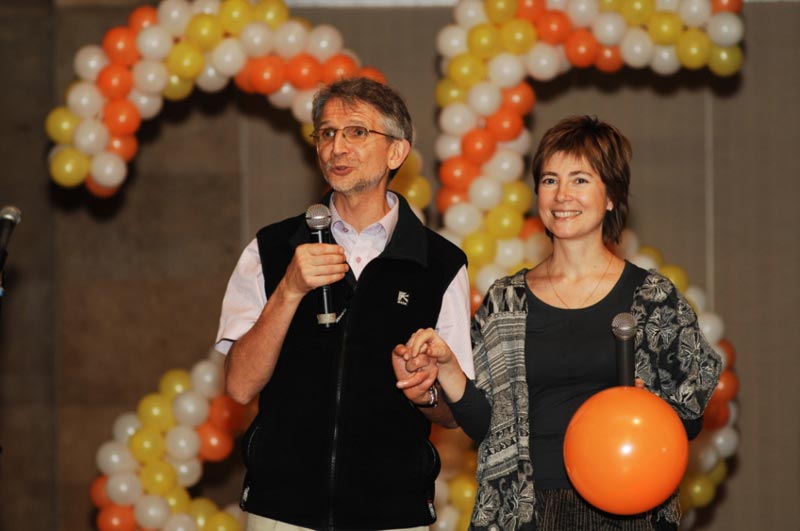Syntone overview
Author: Kozlov N. I., Ph.D. of Psychology
Rector of the University of Practical Psychology
History
The history of Syntone training centre began at 1983 as practical psychology club. Club was founded by N. I. Kozlov, who is the professor of psychology now. The first trainings were about communication and interpersonal attitudes. The idea of harmonic communication became the basis and the mission of a club and it is reflected in the name of our centre. The word "Syntone" means consonance and unison in psychological meaning.
The main approach to study were continuous trainings for 30-40 students. Each trainer taught several parallel groups. Also the big methodical work was done. That work gave opportunity to teach new trainers and to open branches in other cities.
Currently Syntone is a big structure that allows teaching more than 1000 people at the same time. And more than 10000 people already passed Syntone psychological program.
Activity
Syntone trainings include different activities: lectures, group work, discussions, art, role-playing and business games and other psychological exercises.
The theoretical basis of Syntone program is described in N. I. Kozlov books “How to treat myself and other people. Every day practical psychology", "Philosophical tales for life thinkers", "Veritable truth or practical psychologist manual", "Formula of personality", "Book for people who like to live", "Success formula", "Seventeen instants of success" that were published in more than 10 000 000 copies.
Since 1983 more than 60 training programs were created. They are used in different ways of psychological and pedagogic teaching.
Achievements and awards
The Syntone methods were approved by education department of Russian federation for using in teaching process basic for education and colleges.
In 2000 Syntone was nominated as best practical psychology project in Russia.
In 2010 Practically Psychology University was open based on Syntone techniques. The best trainings programs were formed together and certified as additional education course for practical psychologists, trainers and school psychologists.
Study program offer from Training Centre Syntone
Introduction to Syntone activity in cognitive psychology
The prime Syntone activity is applying the psychological ideas to peoples every day life. The main advantage of our centre is the practical consideration, practical proof or disproof of psychological hypotheses. For example on our trainings we suggest some cognitive pattern to our students. Then the students can use this pattern to make difficult choice or to act in different situations. The objective results and the subjective feelings of students show the effectiveness of this cognitive pattern.
For 25 years of such investigations and observations we distinguished the set of most productive psychological ideas and effective cognitive patterns and combined them into program of personal development called Syntone-program. Thousands people who had learned this program reported dramatically improvements in all fields of their life including career, health, personal relationships.
Here we survey the key aspects of Syntone-program and the results of their employing.
Aspects of Syntone-programm
1) Ways of psychological perception and interpretation
In cognitive approach any information is received interpreted according to some cognitive pattern. Often this pattern is chosen unconsciously depending on person current emotions, needs or habits. That's why our interpretation of information is often corrupted and ineffective. The other way is to choose cognitive pattern consciously according to current situation and aims.
We distinguish 6 basic ways of perception and interpretation:
- Initial "Common Pattern" position - unconscious pattern without any interpretation.
- Me - Personal based interpretation of facts.
- You - Interpretation based on possible feeling of other person.
- Only facts - Interpretation based on observed facts only,
- Complex view - Interpretation based on system approach,
- Angel
On our trainings we teach how to choose these pattern consciously and give the examples from every day life when these patterns are much more effective against the unconscious familiar pattern.
2) "Total Yes" and "Internal translator"
This cognitive pattern is effectively used in communications. "Total Yes" makes communications more fruitful and pleasing. It's also very helpful in conflicts to moderate contradictions and to find compromises. "Internal translator" is the next step of Total "Yes" pattern. It allows to understand and to change opinion of other people smoothly and politely. It also allows predicting perception in communications.
3) "Four ways to live"
We suggest special scale to measure the personal development level. It's shown that there is severe correlation between such features of character like strong will, responsibility, self control, creativity and 4 cognitive patterns considered in axis Care and Resources:
- Parasite
- Romantic
- Consumer
- Creator
4) Two types of "Why?", pattern "It happens" against pattern "I plan"
Our observations show that the biggest part of Russians are passive. They are waiting that somebody or something (usually government) should say what is right and what to do. Such cognitive pattern is ineffective situations in when person should make choice or should solve the problem by himself. On our training we suggest active and responsible position "Who if not me?" instead of Others know better"
5) Methods to control emotions
The psychologists of Syntone consider new original approach to the nature and the origins of emotions. Emotions are considered as cognitive patterns learned in childhood. Subsequently these patterns become unconscious and it seems that it is impossible to control emotions.
Our trainings approved that special exercises develop persons skill to activate or to moderate the biggest part of emotions. These exercises make person more steady, balanced and self controlled. They also enrich the set of emotions.
6) Practical aspects of happiness
In Syntone program we suggest the practical view on happiness and provide number of special exercises to improve psychological well being.
7) Practical aspects of Meaning of Life
8) Practical aspects of love
We understand that these fundamental questions are too complicated to solve them completely. But we suggest some practical approaches for better understanding these ideas. Using our approaches people can develop their own philosophy and to find their own answers more effectively.

